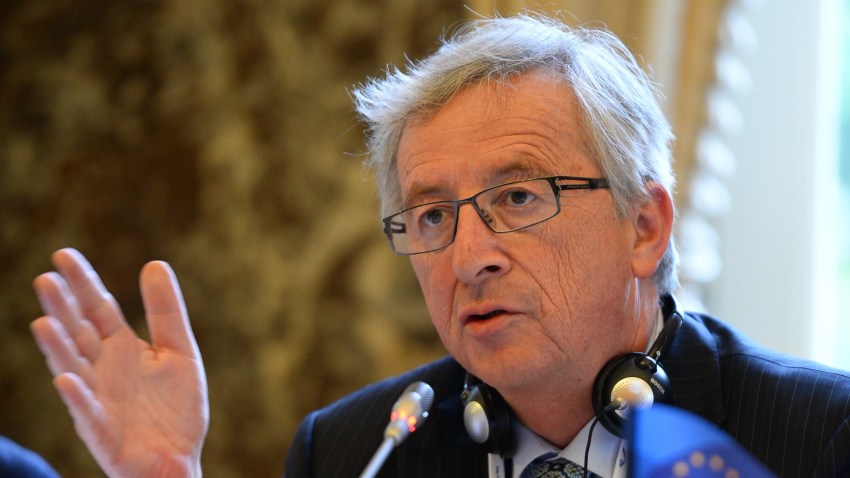Swedish, Dutch, German and U.K. leaders
held a mini-summit Monday in Sweden to discuss, among other topics, the selection of the next European Commission president. The term of the current commission president, Jose Manuel Barroso, runs out by Oct. 31, but his replacement could be selected as early as this summer.
But even after Monday’s meeting, it remains an open question not only who the next commission president will be, but how that candidate will be selected. German Chancellor Angela Merkel last month announced her support for former Luxembourg Prime Minister Jean-Claude Juncker, while British Prime Minister David Cameron has spearheaded a campaign against Juncker’s candidacy with tepid support from the leaders of Hungary, Sweden, the Netherlands and Finland.
Much of the fuss surrounding Juncker’s candidacy comes from changes introduced to the selection process for the commission president by the Lisbon Treaty, signed in 2007 and entered into force in 2009. Prior to the Lisbon Treaty, the European Council, a separate body from the European Commission that comprises the heads of state or government of all European Union member states, nominated the commission president, with the European Parliament giving final “approval” of the decision. (While the nomination was technically decided by qualified majority, meaning that no individual member state could veto the selection, the council traditionally works by consensus.)
The Lisbon Treaty, however, introduced the requirement that the council first take into consideration European Parliament elections before choosing a candidate, still by qualified majority of the council. Moreover, the European Parliament
was now tasked with “electing” the council’s nomination for commission president.
The European Parliament and its party groups—the coalitions of like-minded parties from member states that make up the voting alliances within the European Parliament—have interpreted the Lisbon Treaty, and specifically the term “elect,” to mean they have the right to select the nominee for commission president that the council will then approve. To this end, the parliament introduced the “Spitzenkandidaten,” or lead candidates, system. Earlier this year each party group nominated its own lead candidate for commission president, the idea being that a vote for a party group in last month’s European Parliament elections would also be a vote for that group’s commission president candidate.
This change was made to address concerns about the ever-present democratic deficit in the European Union, though, as
John Peterson, professor of international politics at the University of Edinburgh, said in an email interview, “The vast majority of voters in most member states didn’t even know about the Spitzenkandidaten, and certainly very few votes were determined by these changes.”
The European Parliament is keen to have a larger role in the commission president selection process, since the parliament is often seen as the weakest of the European institutions, while the position of commission president is one of the most important in the European Union. Since the European Commission is the only body that can propose legislation, the commission president can be an influential figure through his or her agenda setting, policy initiatives and representation of the European Union abroad.
Juncker is the candidate of the European People’s Party (EPP), the party group that won the highest percentage of seats in the May European Parliament elections, with 28.5 percent of seats. Under the European Parliament’s interpretation of the Lisbon Treaty, Juncker’s nomination should have been a done deal. However, many on the European Council, notably Cameron, are against his nomination.
“Juncker is viewed as a federalist member of the discredited Euro-elite and yesterday’s man,” Peterson explains.
Cameron said that Juncker will not help boost the EU’s standing in the U.K., where Euroskepticism runs high, and that he does not reflect the voters’ desire for change on the European level. Juncker’s views endorsing a federation of European states that would move more decision-making away from member states have also alienated many voters, particularly those who voted for far-right, anti-European parties in the European Parliament elections.
But the issue extends beyond Juncker himself. Many European leaders have openly disagreed with the European Parliament’s interpretation of the Lisbon Treaty. Notably, European Council President Herman Van Rompuy
said last October, “You don’t have to look for solutions to things that aren’t a problem. To go and look for ‘faces’ to guide the EU: That’s not a solution.” Merkel also expressed her skepticism of the European Parliament’s Spitzenkandidaten plan, saying in an interview with Der Spiegel last year that “the European Parliament and the European Council should be jointly responsible for the election of the president.”
Merkel, however, has since
given her backing to Juncker’s candidacy, despite initial reluctance. Merkel was “hammered in the German media . . . as well as by members of her own party for not showing respect for the [European Parliament’s] institutional dignity,” Peterson explains.
Juncker received an additional boost last week when Martin Schulz, the candidate from the center-left Socialists and Democrats party group that came in second in European Parliament elections,
backed his candidacy. Juncker also has the support of the majority of the European Parliament and those of the EU member states who have not offered support to Cameron’s campaign against him.
So what happens next? Peterson says that it “depends to a considerable extent on how Cameron plays his cards.” This week’s mini-summit in Sweden is likely to be the first of many, including the European Council Summit in Brussels on June 26-27, “before something close to a consensus emerges,” he adds. “Europe can’t get by with a lame duck commission for long, so I assume we’ll have a result before Aug. 1.”

